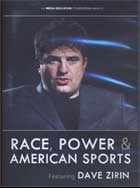
Race, Power & American Sports 2013
Distributed by Media Education Foundation, 60 Masonic St., Northampton, MA 01060; 800-897-0089
Produced by Sut Jhally and Jeremy Earp
Directed by Daniel Marracino
DVD, color, 45 min.
College
Sports, African Americans, Civil Rights, Race Relations, Discrimination, Social Sciences
Date Entered: 01/06/2014
Reviewed by Rob Bohall, George Fox UniversityUsing dozens of classic photos and video footage interspersed with narration and interview excepts, this film is a cerebral discourse by author and analyst Dave Zirin on the role of race in major professional sports over the past two centuries of American history.
Sports constitute the “American common language” which can facilitate discussions on a wide variety of social and political issues, including ethnicity, gender relations, economic inequality and homophobia. And the condition of black professional athletes is representative of the condition of African Americans in the larger society.
Zirin chronicles his topic effectively, presenting distinct periods in American athletic history: the period prior to the Civil War when sports were fully integrated; the post-Civil War segregation of sports along racial lines driven by Jim Crow laws; politicization of sports during the Civil Rights era, and the modern post-political sports world dominated by big business.
The impact of a number of influential black athletes illustrate how race-related social norms throughout history have been challenged through sports:
- Boxers Jack Johnson and Joe Louis showing that blacks could compete with whites on an equal playing field
- Dominant Olympic sprinter Jesse Owens refuting Hitler’s claims of white superiority
- Jackie Robinson breaking of the color barrier in baseball
- Muhammad Ali speaking out brashly and defiantly, joining the Nation of Islam, and refusing to fight in Vietnam
Rather than an objective documentary, the film is a one-sided vehicle for Zirin to promote his viewpoints. The interview questions are not challenging or exploratory, and at times feel forced and unnatural.
Overall the film holds together well, though the volume and image quality fluctuate, and some cuts are feel a bit rough. It’s interesting material, but this reviewer found himself occasionally yawning.
Recommended for college use, with reservations.